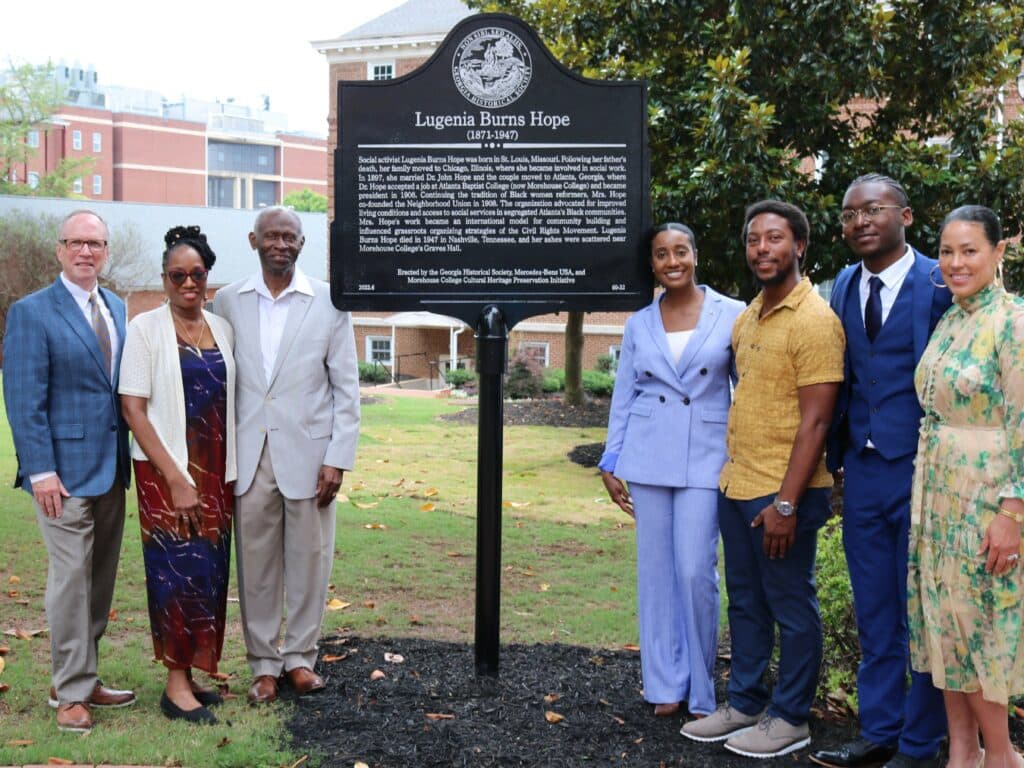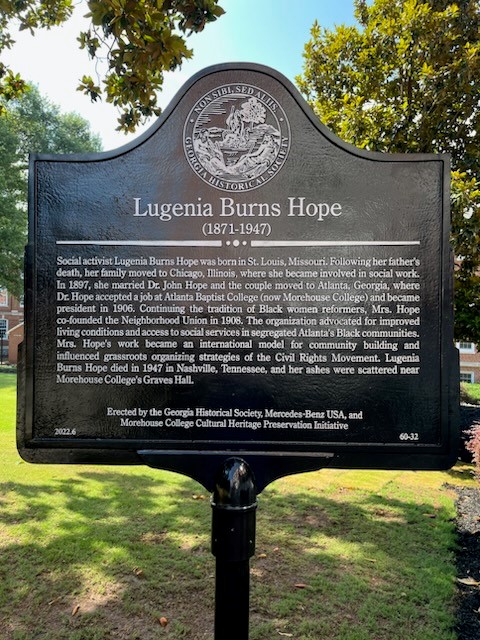
Atlanta, GA, June 14, 2023 – The Georgia Historical Society (GHS) unveiled a new Civil Rights Trail historical marker recognizing African-American civic leader and community organizer Lugenia Burns Hope (1871-1947) on Tuesday, June 13, 2023, in Atlanta. GHS dedicated the new marker in partnership with Mercedes-Benz USA and the Morehouse College Cultural Heritage Preservation Initiative.
"As a founder of Atlanta's Neighborhood Union, Lugenia Burns Hope advocated for African Americans to have increased accessibility to social services and improved living conditions,” said Elyse Butler, Marker Manager at GHS. “The Georgia Historical Society is pleased to add this new historical marker to the GHS Georgia Civil Rights Trail."
The marker joins the 60 historical markers across the state that make up GHS’s Georgia Civil Rights Trail, an initiative that uses historical markers to document the struggle for human and civil rights from the period following Reconstruction to the modern movement in the mid twentieth century.
“All of us, as individuals and as corporations, can do our part to actively ensure members of our community have equitable access to safety, health, education, and opportunity for success," said Erica Bolden, Head of Diversity, Equity, Inclusion, and People Analytics at Mercedes-Benz USA. "And with the specific support of partners like the Georgia Historical Society and Morehouse College, Mercedes-Benz USA is honored to help shed light on and uphold the wonderful legacy of Lugenia Burns Hope and all that she did to fight and advocate for the African-American community. This marker is an inspirational reminder of our collective responsibility to remain actively engaged and do our part to create change.”
Lugenia Burns Hope spent her formative years in Chicago, Illinois, where she began a career in social activism, working at two charity organizations: King Daughters and Hull House, founded by Jane Addams. After marrying Dr. John Hope, a native Georgian and educator, they moved to Atlanta, where Dr. Hope began to teach at Atlanta Baptist College (later Morehouse College).
Mrs. Hope noticed social decay in segregated Atlanta’s underprivileged Black neighborhoods. She and several other women formed the Neighborhood Union in 1908, and she served as its first president until 1935. Mrs. Hope was also involved with many other organizations, including the Young Women's Christian Association, the National Association of Colored Women, President Herbert Hoover’s Colored Advisory Commission, and the NAACP. After she died in 1947, Mrs. Hope’s ashes were scattered near Morehouse College’s Graves Hall.
The marker dedication took place at Graves Hall at 830 Westview Dr. SW in Atlanta. Speakers included Lawrence Edward Carter, Sr., Ph.D., Founding Dean of the Martin Luther King Jr. International Chapel, Professor of Religion, College Archivist, and Curator; W. Todd Groce, Ph.D., President and CEO, Georgia Historical Society; Erica Bolden, Head of Diversity, Equity, Inclusion, and People Analytics, Mercedes-Benz USA; Clarissa Myrick-Harris, Ph.D., Professor of Africana Studies and Co-Founder, Morehouse College Cultural Heritage Preservation Initiative; Karcheik Sims-Alvarado, Ph.D., Assistant Professor of Africana Studies, Director of the Morehouse College Public History Program; Christopher Smothers, CEO, Unearthing Your Roots, Inc., graduate of Clark Atlanta University and Morehouse College Public History Program; and Keon Rosado, rising Morehouse College Senior, the Martin Luther King, Jr. International Chapel Historian and Student Archivist.

The marker text reads:
Lugenia Burns Hope
(1871-1947)
Social activist Lugenia Burns Hope was born in St. Louis, Missouri. Following her father’s death, her family moved to Chicago, Illinois, where she became involved in social work. In 1897, she married Dr. John Hope and the couple moved to Atlanta, Georgia, where Dr. Hope accepted a job at Atlanta Baptist College (now Morehouse College) and became president in 1906. Continuing the tradition of Black women reformers, Mrs. Hope co-founded the Neighborhood Union in 1908. The organization advocated for improved living conditions and access to social services in segregated Atlanta’s Black communities. Mrs. Hope’s work became an international model for community building and influenced grassroots organizing strategies of the Civil Rights Movement. Lugenia Burns Hope died in 1947 in Nashville, Tennessee, and her ashes were scattered near Morehouse College’s Graves Hall.
Erected by the Georgia Historical Society, Mercedes-Benz USA, and Morehouse College Cultural Heritage Preservation Initiative
###
For more information about the Lugenia Burns Hope historical marker dedication or the Georgia Historical Society marker program, please contact Keith Strigaro, Director of Communications, at 912.651.2125, ext. 153 or by email at kstrigaro@georgiahistory.com.
ABOUT THE GEORGIA HISTORICAL MARKER PROGRAM
The Georgia Historical Society (GHS) administers Georgia’s historical marker program. Over the last 25 years, GHS has erected more than 300 new historical markers across the state on a wide variety of subjects. GHS also coordinates the maintenance for more than 2,100 markers installed by the State of Georgia prior to 1998. Online mapping tools allow users to design driving routes based on historical markers, and a mobile app helps visitors locate and learn about markers nearby. Visit georgiahistory.com for more ways to use Georgia’s historical markers and experience history where it happened.
ABOUT THE GEORGIA HISTORICAL SOCIETY
Georgia Historical Society (GHS) is the premier independent statewide institution responsible for collecting, examining, and teaching Georgia history. GHS houses the oldest and most distinguished collection of materials related exclusively to Georgia history in the nation.
To learn more visit georgiahistory.com.
